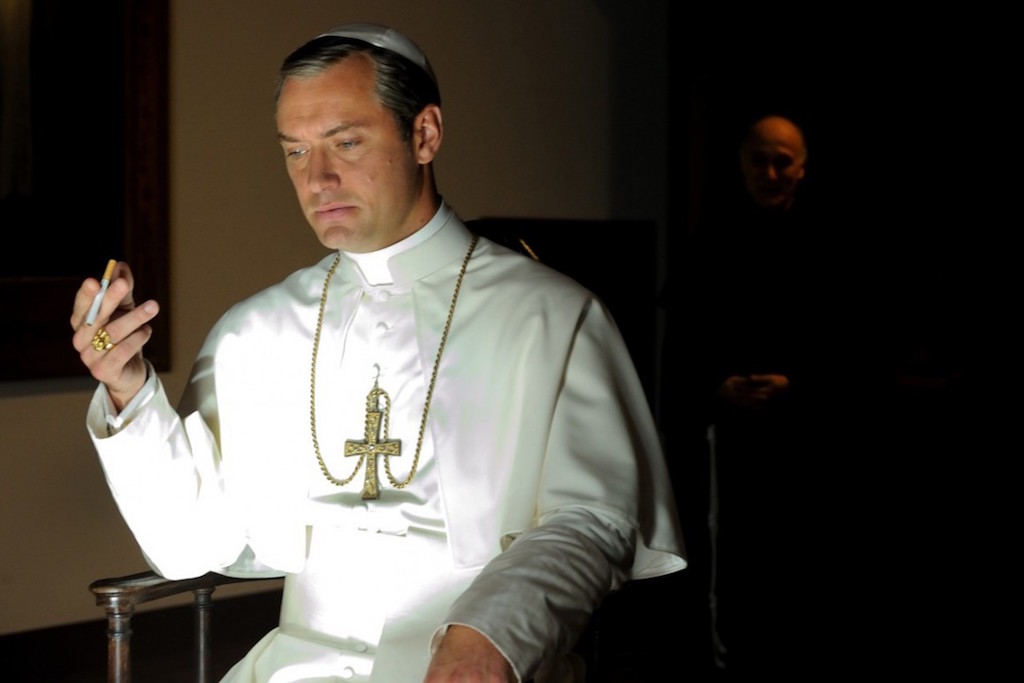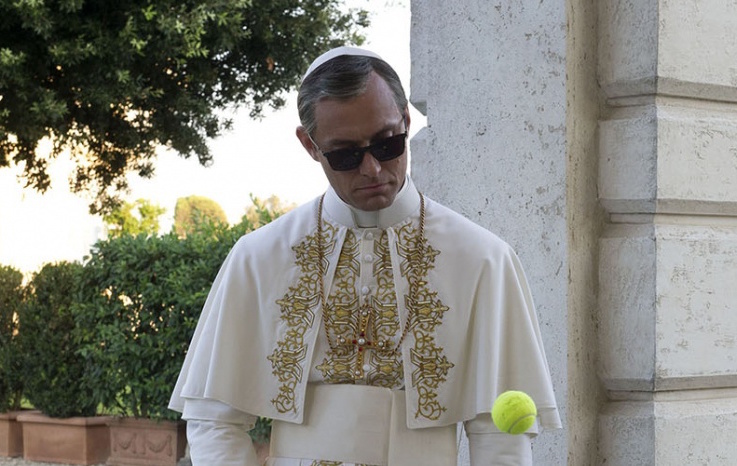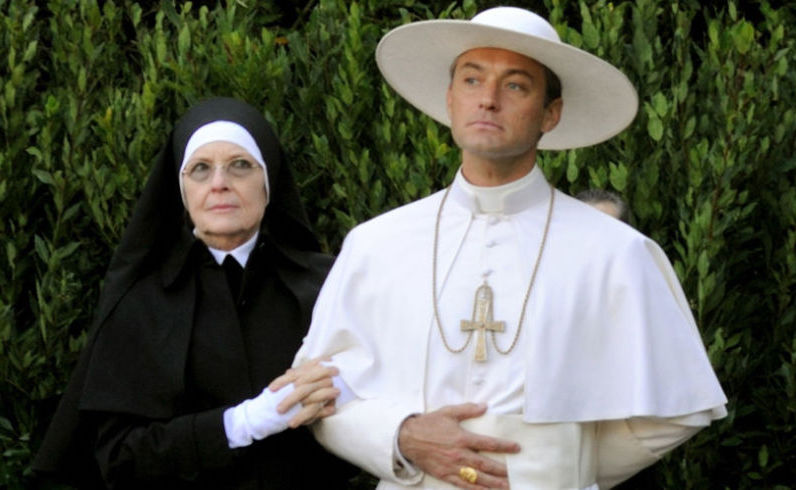Give Pope A Chance: In Defence Of The Extremely Memeable HBO Series ‘The Young Pope’
The show is silly and self-serious and at one point includes LMFAO in the soundtrack... But it also knows all this.

Hitler at a health spa. A giraffe in the Colosseum. A goth with a gun. Without context these juxtapositions might seem provocative or a little gauche; the kind of imagery that results in hyper-sharable photography or half-hearted high school creative writing.
When it comes to arthouse cinema it’s a fine line between pleasure and pain — a mawkish soundtrack or over-earnest monologue can tip the balance from delightfully disruptive to gratingly artificial at any moment. On the small screen, surrounded by the realities of our lives, the line’s pulled even tighter. Such is the path trodden by The Young Pope, a new series that comes via American, British, and European co-financing, from the mind of Italian auteur Paolo Sorrentino.
The quirky contrasts listed above are all from his recent films — Youth, This Must Be The Place, and The Great Beauty — and The Yong Pope wastes little time in adding to the visual oddities that so amuse its creator. Nuns playing volleyball. Cardinals texting. The very young Pope himself (Jude Law) ordering a Cherry Coke Zero. Your enjoyment of The Young Pope may vary depending on your patience for this kind of thing.

Let’s assume the rollerblades, Bart Simpson backpack, and ironic can of PBR are just out of shot.
The internet’s collective patience runs like a bushfire and — in America at least, where the first episode screens tonight — The Young Pope might have shot its load before the main event. This show is oh so meme-able. It sounds like a throwaway 30 Rock gag. Can a tsunami of song spoofs (some so awkwardly syncopated they’d make Weird Al shdh) exhaust an audience before they’ve even watched a single scene? Or will the collective “whu?” of plenty of critics cast it into the television novelty heap without serious consideration?
WRITER: So, there’s this Pope, right?
HBO EXEC: Go on
WRITER: But get this – he’s young. And he fucks
HBO EXEC: [cigar falls out of mouth]— Patrick Monahan (@pattymo) December 7, 2016
TEEN 1: Church is so boring.
TEEN 2: It's so out of touch.
THE YOUNG POPE approaches pulpit: "Some…BODY once told me–"
TEENS: HOLY SHIT— Anne T. Donahue (@annetdonahue) January 5, 2017
I’m hoping against both. Come on team — Tony Soprano talked to an animatronic fish. The second season of The Wire pivoted on the death of a duck. Give The Young Pope a chance, and let him have his kangaroo.
Self-Serious Vs Self-Aware
When you watch anything that is purposely heightened, or exaggerated, or exists outside the standard setups of logical and emotional reality, from William Shakespeare to Wes Anderson, do you complain of artifice or accept the premise and get on with the show? It’s easy to call out all art as wank, and with The Young Pope existing in an aesthetic realm somewhere between artist Matthew Barney’s large scale video work and the high gloss tongue-in-cheek pretensions of ’90s music videos, it’s a show highly susceptible to accusations of self-love. But the show knows all this.
The Young Pope is a farcical existential pantomime. While we expect creative liberties to be made in the representations of complex systems (remember when C.J. on The West Wing went from Press Secretary to Chief of Staff? Or when House of Cards?) The Young Pope seems less interested in the day-to-day machinations of rule and religion in a small nation than The Wizard of Id.
No one aiming for reality would cast Diane Keaton, the most Jewish of WASPs, as a Bronx-accented nun (though her prickly dormouse demeanour poking out from her habit is a welcome presence among the largely male cast). No rose-tinted Hollywood glaze excuses golden Brit boy, Law (a similarly sharp East Coast bray), and expects the viewer to mentally chart a realistic course from abandoned child to global religious leader. But in the context of the cloistered papal community, this pageantry rings true.
Jude Law as Pope Pious XIII (aka Lenny), in HBO’s best-bought holy Halloween finery, is a neat extension of the decadence and overwrought symbolism that weighs down the contradictory epicentre of Catholic faith, and the contrasts between our highest ideals and our dirty realities.

Law: “I honestly thought I was signing up for a Will Ferrel movie.” Keaton: “I haven’t read a script since 1998.”
Does This Mean It’s Any Good?
All these games of dress-up do, however, leave Lenny a blank. Each of Lenny’s interactions, with subservients and acquaintances old and new, is a spin for ultimate dominance, and the only wink to camera to let us know Lenny’s true feelings is in the opening credits.
The lack of empathetic access to Lenny is the show’s largest gamble — are we really meant to connect with a protagonist so privileged that he’s not only male, white, straight, young, handsome, and wealthy, but is the living conduit for the word of God?
The ‘unlikable’ debate has cornered television for nearly a decade, stretching from Tony Soprano to Hannah Horvath, and the new slew of millennial asshole comedies (see You’re The Worst, Loving, and Search Party). All of these shows do, though, go out of their way to provide background and insight into why their characters might behave in such unsavoury fashion. Lenny, however, is presented as singularly inexplicable.
It’s a challenge to pop psychology, to our concepts of what is ‘out of character’, to our need to connect with the faces on the screen. The Young Pope and the young Pope seesaw between extremism, as Lenny lambasts tolerance and openness, preaching total devotion or absolute demise, and introspection. Sorrentino is a master of the spaces in-between — the non-locations of transit and recovery, of public spaces after hours. The Young Pope, in the non-city of the Vatican, hovers around locations that remove immediacy and encourage reflection.
And then it puts LMFAO on the soundtrack. So, yeah… it’s complicated.
Rarely are we asked to acknowledge the constructed world of television as we watch it. Sure, tones and styles vary, from the highfaluting monologuing of Deadwood to the dreamy inner head-scapes of Enlightened. But it’s not often that we’re presented with a piece that worries less about the realism of its internal world and more about the ruminations of the idle mind.
Most television shows work so hard to give their characters an opportunity to announce their intentions and emotions. Bar stool confessionals, death-bed speeches, “that reminds me of a time”… None of these are more realistic than the whiplash denouncements of Lenny, yet we’re trained to accept their artificial rhythms on the telly while we leave impressionism for the big screen. Sorrentino has created something imperfect and unique, perhaps overlong, but with thoughtful ambition.
As the whole world turns to watch the ultimate in white, rich, male pettiness take reign, spend a little time with The Young Pope and wonder — how would you act if you got everything you wanted?
–
Matt Roden hosts the Perfect Pitch podcast, where he and his writer/comedian friends catalogue 100 new ideas for movies so Matt doesn’t get sued by Hollywood.